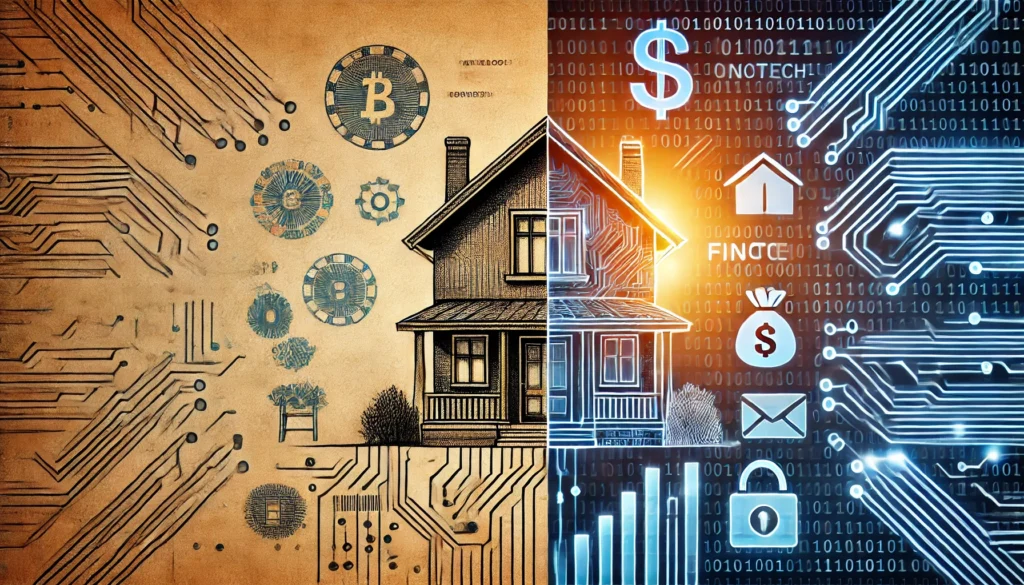The Role of Fintech in PropTech Evolution: Revolutionizing Real Estate Transactions

As we delve into the rapidly evolving world of PropTech, it’s becoming increasingly clear that Fintech is playing a pivotal role in shaping the future of real estate transactions. This convergence of financial technology and property technology is creating new opportunities, streamlining processes, and democratizing access to real estate investments. In this edition of PropTech RoundUp, we explore the symbiotic relationship between Fintech and PropTech, and how it’s transforming the real estate landscape.
The Fintech-PropTech Nexus
The intersection of Fintech and PropTech is creating a new paradigm in real estate transactions. From innovative financing models to blockchain-based property transfers, the integration of these technologies is addressing long-standing challenges in the real estate sector.
1. Alternative Lending Platforms
Traditional mortgage processes are often slow, paperwork-intensive, and inaccessible to many. Fintech companies are disrupting this space by offering alternative lending platforms that leverage big data and AI for faster, more inclusive credit assessments.
Innovation Spotlight: Nigerian startup Aella Credit uses a proprietary algorithm to assess creditworthiness, offering micro-mortgages to individuals who might not qualify for traditional bank loans.
2. Fractional Ownership and Tokenization
Blockchain technology is enabling the tokenization of real estate assets, allowing for fractional ownership and increased liquidity in the property market.
Case Study: In South Africa, RealFin has launched a platform that tokenizes commercial real estate, allowing investors to buy fractions of high-value properties for as little as $100.
3. Automated Valuation Models (AVMs)
Fintech-powered AVMs are revolutionizing property valuation, using machine learning algorithms to analyze vast amounts of data for more accurate and timely valuations.
Market Mover: Kenyan company Shika Realty has developed an AVM that incorporates non-traditional data points like mobile money transactions and social media activity to provide valuations in areas with limited historical sales data.
4. Smart Contracts for Property Transactions
Smart contracts built on blockchain technology are streamlining property transactions, reducing the need for intermediaries and minimizing the risk of fraud.
Trend Watch: The UAE’s Dubai Land Department has implemented a blockchain-based real estate platform that automates the process of recording and transferring property ownership.
5. Rent-to-Own Schemes
Innovative Fintech models are making homeownership more accessible through rent-to-own schemes that blur the line between renting and buying.
Example: In Egypt, Shahry offers a rent-to-own program that allows tenants to build equity while renting, with a portion of each month’s rent going towards a future down payment.
6. Cross-Border Transactions and Currency Solutions
Fintech is facilitating international real estate investments by providing solutions for cross-border transactions and currency exchange.
Innovation Example: TransferWise (now Wise) has partnered with several African PropTech companies to offer low-cost international money transfers for property purchases.
The Impact on Real Estate Stakeholders
The Fintech-PropTech convergence is having a profound impact on all stakeholders in the real estate ecosystem:
- Buyers and Sellers: Enjoy faster, more transparent transactions with reduced costs.
- Investors: Gain access to a wider range of investment opportunities with lower barriers to entry.
- Developers: Benefit from new funding sources and more efficient project management tools.
- Real Estate Agents: Adapt to new technologies that streamline processes and provide data-driven insights.
- Banks and Financial Institutions: Face disruption but also opportunities for partnerships and innovation.
Challenges and Considerations
While the integration of Fintech and PropTech offers numerous benefits, it also presents challenges:
- Regulatory Hurdles: Many countries are still developing frameworks to regulate these new technologies.
- Data Privacy Concerns: The use of personal financial data raises important privacy considerations.
- Digital Divide: There’s a risk of excluding those without access to digital technologies.
- Market Volatility: New financial models may introduce new forms of market risk.
The Future of Fintech in PropTech
As we look to the future, the convergence of Fintech and PropTech is likely to accelerate. We anticipate seeing:
- More sophisticated AI-driven lending models
- Increased adoption of blockchain for property rights and transactions
- Greater integration of IoT data in property valuation and management
- Emergence of new investment products combining real estate and financial derivatives
Conclusion: A New Era for Real Estate
The marriage of Fintech and PropTech is ushering in a new era for real estate, characterized by greater efficiency, transparency, and accessibility. As these technologies continue to evolve and mature, they have the potential to address long-standing challenges in the property market and create new opportunities for innovation and growth.
At PropTech RoundUp, we’re committed to tracking these developments and providing in-depth analysis to help you navigate this exciting convergence of finance and real estate technology. Stay tuned for our upcoming comprehensive report, which will provide a deeper dive into the Fintech-PropTech nexus and its implications for the African real estate market.